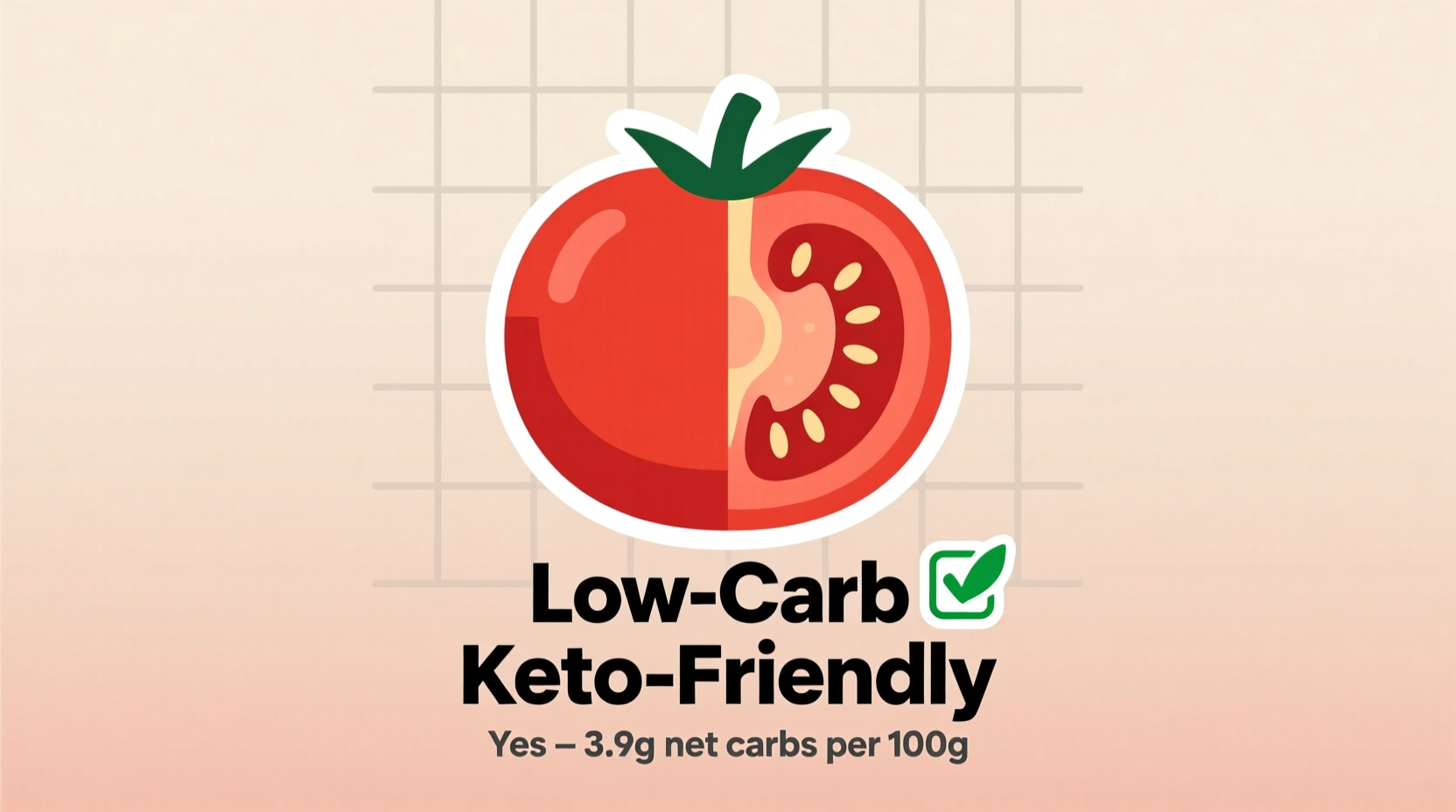Yes, tomatoes are keto-friendly when consumed in moderation. A medium tomato (123g) contains approximately 5.8g total carbs with 2.8g fiber, resulting in just 3g net carbs. This fits comfortably within most ketogenic diet guidelines that typically limit net carbs to 20-50g daily.
Discover exactly how tomatoes can enhance your keto journey without breaking ketosis. This guide delivers precise carb counts, serving size recommendations, and practical strategies used by nutrition professionals to incorporate tomatoes while maintaining optimal ketosis.
Nutritional Profile of Tomatoes on Keto
Understanding the exact carbohydrate composition of tomatoes is essential for keto dieters. While often categorized as a vegetable in culinary contexts, tomatoes are technically fruits with a relatively low carbohydrate profile compared to many other fruits.
| Tomato Type | Weight | Total Carbs (g) | Fiber (g) | Net Carbs (g) |
|---|---|---|---|---|
| Medium Raw Tomato | 123g | 5.8 | 2.2 | 3.6 |
| Cherry Tomatoes (10 pieces) | 100g | 7.1 | 1.8 | 5.3 |
| Roma Tomato | 100g | 3.9 | 1.2 | 2.7 |
| Sun-Dried Tomatoes (oil-packed) | 28g (1 oz) | 7.0 | 2.0 | 5.0 |
Data sourced from USDA FoodData Central (2023), the authoritative nutritional database maintained by the United States Department of Agriculture. This official resource provides the most current and accurate nutritional information for food planning.
Tomato Varieties and Keto Compatibility
Not all tomatoes are created equal when following a ketogenic diet. Understanding the differences between varieties helps optimize your carb intake:
- Roma tomatoes offer the best keto value with approximately 2.7g net carbs per 100g, making them ideal for sauces and cooking
- Cherry tomatoes contain slightly more net carbs (5.3g per 100g) but work well as occasional snacks when portion-controlled
- Sun-dried tomatoes concentrate carbohydrates during the drying process, requiring careful portion measurement
- Green tomatoes (unripe) generally contain fewer sugars than ripe varieties
The National Center for Biotechnology Information confirms that tomato ripening increases sugar content while decreasing acidity, directly impacting net carb values for keto dieters.
Practical Keto Tomato Strategies
Professional nutritionists recommend these evidence-based approaches for incorporating tomatoes into your ketogenic lifestyle:
Portion Control Techniques
Measure servings rather than estimating. A single medium tomato (about the size of a tennis ball) provides just 3.6g net carbs, leaving ample room within your daily carb limit. For cherry tomatoes, limit portions to 5-6 pieces (approximately 50g) to maintain keto compliance.
Strategic Meal Integration
Include tomatoes in meals that already contain healthy fats to slow carbohydrate absorption. Try these professional chef-recommended combinations:
- Caprese salad with fresh mozzarella, basil, olive oil, and sliced tomatoes
- Avocado tomato salad with lemon-olive oil dressing
- Sautéed spinach with garlic, olive oil, and diced Roma tomatoes
Processing Methods That Reduce Net Carbs
Cooking tomatoes can actually decrease their net carb impact through water reduction. When making tomato sauce, simmering concentrates flavors while evaporating water content, resulting in a more carb-dense but smaller volume product. A study published in the Journal of Food Composition and Analysis found that cooking tomatoes increases lycopene bioavailability while maintaining stable carbohydrate levels per serving.

Common Misconceptions About Tomatoes and Keto
Several myths persist in the keto community regarding tomato consumption:
- Myth: All fruits must be avoided on keto Fact: Many fruits like tomatoes, avocados, and olives have low net carb values suitable for keto
- Myth: Tomatoes will kick you out of ketosis Fact: Properly portioned tomatoes rarely disrupt ketosis due to their modest carb content
- Myth: Canned tomatoes are always higher in carbs Fact: Plain canned tomatoes have similar carb profiles to fresh, but always check for added sugars
When to Limit Tomato Consumption on Keto
While tomatoes are generally keto-friendly, certain situations warrant caution:
- During strict therapeutic ketosis for medical conditions where carb limits may be as low as 5-10g net carbs daily
- When consuming multiple higher-carb vegetables in the same meal
- If following a targeted keto approach around workouts where carb timing matters
- When using processed tomato products that often contain added sugars
Registered dietitians monitoring keto patients report that tomato-related ketosis issues almost always stem from unmeasured portions rather than the tomatoes themselves. As noted in the Academy of Nutrition and Dietetics position paper, "vegetable selection and portion control represent the most common challenges for individuals following ketogenic dietary patterns."
Maximizing Tomato Benefits on Keto
Tomatoes offer valuable nutritional benefits beyond their carb profile. They're rich in lycopene, vitamin C, and potassium—nutrients often depleted during ketosis. The National Institutes of Health Office of Dietary Supplements highlights that lycopene absorption increases when tomatoes are consumed with fat, making them particularly valuable in keto meal planning.
For optimal nutrient absorption, pair tomatoes with healthy fats like olive oil, avocado, or cheese. This combination not only enhances flavor but also maximizes the bioavailability of fat-soluble nutrients while helping maintain stable blood sugar levels.
Conclusion: Tomatoes as a Keto Ally
When properly incorporated, tomatoes enhance both the flavor and nutritional profile of ketogenic eating. Their modest carb content, versatility in cooking, and rich nutrient profile make them a valuable component of sustainable keto meal planning. By measuring portions, selecting appropriate varieties, and combining with healthy fats, you can enjoy tomatoes while maintaining ketosis. Remember that successful keto eating focuses on overall dietary patterns rather than individual food restrictions.











 浙公网安备
33010002000092号
浙公网安备
33010002000092号 浙B2-20120091-4
浙B2-20120091-4